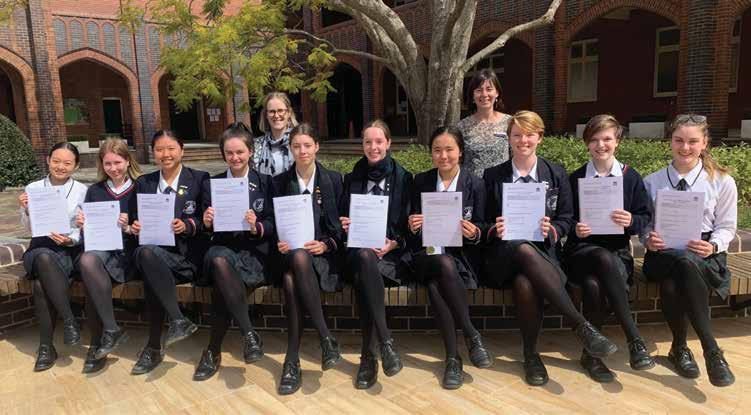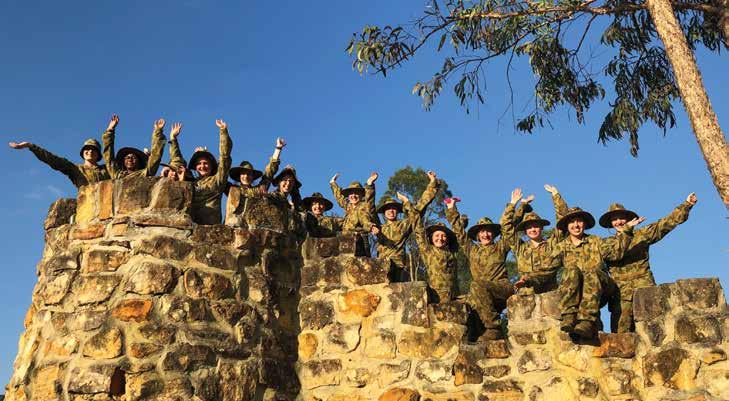
8 minute read
Student research in Science
By Dr Kristie Spence, Head of Learning Area – Science
Pymble’s intrepid Science explorers, the inaugural cohort of Science Extension students and teachers in 2019
In 2018, our girls first experienced the new Higher School Certificate syllabuses for the Sciences, including the introduction of a Science Extension course and a new course called Investigating Science. Science Extension is a wonderful new addition to the suite of Science subjects on offer for the HSC, allowing our keenest young scientists to conduct their own research and experience the joys and frustrations associated with conducting scientific research.
All Science syllabuses now have a much larger focus on problem solving. Furthermore, there is now time allocated to a Depth Study in each of the Sciences in both Years 11 and Year 12. This allocation of 15 hours to a deep dive into one aspect of each subject has been particularly beneficial to development of critical thinking and problem-solving skills. Having time to prototype, struggle and find solutions to the problems Science students face in an experimental setting has allowed our students to further develop their skills and build the confidence only gained by working through problems by oneself. The following insights from past and current Year 12 Science and Science Extension students give readers a window into the types of topics our student researchers are exploring and the foundational experimental and research skills Depth Studies and Science Extension Research Projects are developing. We are excited to see how our Senior Science students are responding to the recent changes brought upon the world by the COVID-19 virus, and look forward to watch them enhance their thinking and problem-solving skills and become part of the next generation of scientists who will take our society into the future.
Osteoporosis and water hardness: Is there a connection?
Ciara Walsham: Pymble Graduate Year 12 2019
A requirement of taking the new course, Science Extension, included conducting a research project in which I chose to examine the effects of water hardness on the prevalence of osteoporosis. The data I had was secondary and was obtained from the Geelong Osteoporosis Study (GOS) and the Barwon Annual Drinking Water Quality Report. With my timeframe and equipment, it was unrealistic for me to collect my own primary data. I conducted this research over the course of three school terms, with guidance from teachers and feedback from peers. Even with the help of others, the process was long and tedious, from finding a research topic to acquiring the data, then cleansing it and analysing it all before I could even find an answer to the posed research question. After the analysis of my data, I found that the difference in water hardness between the towns was not substantial enough, thus my research concluded that there was no significant relationship between water hardness and osteoporosis. One of the challenges I encountered was getting corresponding data, as there were only a limited number of towns that had data for both water hardness and osteoporosis. Another challenge was staying focused and motivated throughout the time we were given to complete this research, as I greatly underestimated the amount of time and effort it takes to conduct scientific research. Ethics were considered and the data obtained was anonymous and gave no indication of the identity of patients involved in the study, maintaining confidentiality. I was disappointed in the lack of groundbreaking discoveries, but this was outweighed by the knowledge and skills gained. I found this type of self-paced learning extremely beneficial, especially during my last year of high school, as it required good time management skills as well as consistent motivation, which was good preparation for university.
STUDENT RESEARCHERS
Are electric vehicles really better for our environment?
Fiona Wang: Pymble Graduate Year 12 2019
I had often heard people talking about electric vehicles as a more sustainable alternative to regular internal combustion engine vehicles. However, I wanted to know if they’re really any better for the environment given that 85 per cent of electricity in Australia is still generated using fossil fuels. So, as part of the Science Extension curriculum in Year 12, I conducted my own research project to investigate the greenhouse gas emissions associated with the use of electric vehicles.
What I found was that the environmental impact of driving electric vehicles depends greatly on where you live. In regions using a greater percentage of renewable resources in generating electricity, the CO2-e emission due to electric vehicles is significantly reduced. However, even in regions where electricity is generated using only fossil fuels, you can still reduce CO2-e emission by about 20 to 55 per cent when you switch to an electric vehicle of a similar size.
This project was the first time I had conducted any sort of formal research. I enjoyed the opportunity to explore something I was curious about with support from my teachers, as well as a mentor from Macquarie University. I initially struggled due to the lack of published data relating the source of electricity in regions of Australia to their emission characteristics. However, I was able to derive a relationship between the percentage of renewable electricity used and the CO2-e emissions from an electric vehicle using data from the US. Through this project, I learnt a lot about the scientific process, and how to turn an idea into meaningful research through a process of literature review, hypothesis, data analysis and feedback. I think the experience definitely encouraged me to ask more questions about everything around me and to investigate the phenomena I don’t yet understand. I’m starting a double degree this year at UNSW, studying Advanced Science and Engineering. The prospect of continuing to learn about the world around me is one that really excites me.
Science Depth Study – Chemistry and Physics
Teresa Su, Year 12 2020
The new Science courses enrich my understanding of scientific research with the inclusion of the Depth Study, which provides much insight into the processes behind research. Normally, in class, we simply learn the laws and concepts of Science, sometimes with description of the experiments that scientists have performed in the past. Although this is interesting and helpful, I had never had a glimpse into the mindset and practice involved in the process of research. It was only when I began planning my own Depth Study projects (in both Physics and Chemistry), that I realised how difficult research is. I encountered many problems in simply investigating the projectile motion of a ball. Issues have included inaccuracies in measurements, unreliability of my results and even the process of calibrating and getting basic equipment to work. The problemsolving skills I gained in planning and performing experiments, however, were invaluable as they forced me to question and examine the choices I make. The obstacles also made me extremely appreciative of the hard work that scientists throughout the centuries have done. I feel very fortunate to be able to study this course because I think the experiences I am gaining will be beneficial to my university study and potentially my future careers. In Physics, there has been an emphasis on modelling, which I find to be both very helpful and fun. Modelling helps me to visualise all the variables that impact an object’s motion, while helping me to have a basic idea of coding and how to input the laws of Physics into a computer program. The Depth Studies also provide me with hands-on lessons on how to approach and tackle problems with an open mindset. The Depth Study experience has truly opened my mind and given me a sneak peek into Science in the real world, including scientific careers, especially in the research field. I did Physics and Biology in Year 11 and enjoyed the Depth Study a lot, which is why I continued to study those subjects and decided to pursue a degree in science where I can carry out more research on topics in which I am interested.
Science Depth Study – Physics
Amy Shi, Year 12 2020
Depth Studies have expanded my understanding of Science greatly and have given me a chance to observe the theories that we have learnt in class in real life. Firstly, they have really deepened my understanding on the topic that we’re learning, as I have become aware of many details and complications that were not written in the textbooks, and could only be observed and discovered when you are engaged in an active experiment yourself. For example, in Year 12 Physics, we carried out an experiment relating to projectile motion. The best part is attempting to identify the cause of the inconsistencies between our result and the expected results calculated by the formulas we’ve learnt from textbooks. This process of discovery and problem solving allowed me and my team to become aware of many real-life complications, as simple as the wind from the fans, the size and position of the ball and way we positioned our ruler. These seemingly minor details will all have a drastic effect on our results. Our next step is to attempt to eliminate these minor errors. This process allowed me to become aware that Science is very closely related to logical thinking and problem solving, and that scientific research and experiments are very rigorous and well-knitted processes, in which precision and reliability are the key requirements. I think the logical thinking and problem solving skills that we have acquired will help us in the future, no matter the career we choose. These have influenced me to always view a problem logically, attempting to find the patterns and relationships behind a certain phenomenon in life, and follow certain rules and procedures to attain the most accurate result. This way of thinking can be used in a variety of subjects, not only limited to Science. But certainly, it gives me a way of thinking that allows me to attempt to explore more deeply when I come across scientific questions in life and avoid any premature conclusions. I very much enjoy Science in the senior years and certainly think the Depth Study is one of the highlights. I think it is a great opportunity for all students to develop skills that prepare them for future careers and studies, and for the years after high school.










